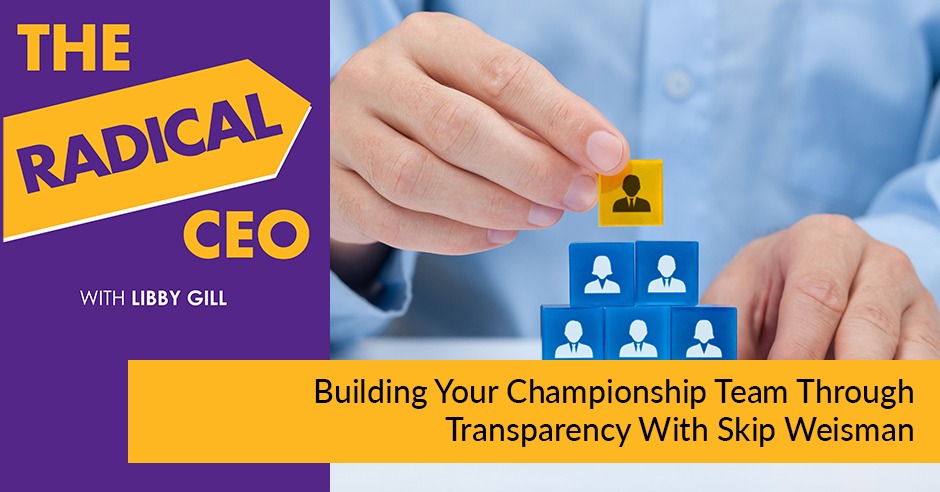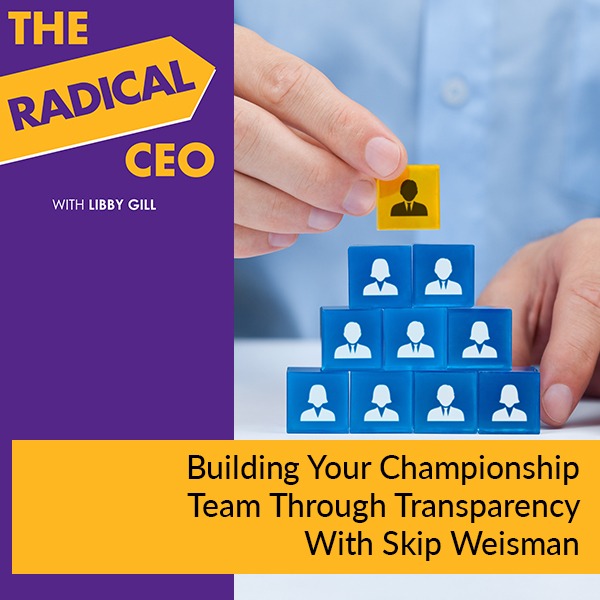
Many companies share detailed financial information with employees once or twice a year. Few companies offer training in financial literacy to their rank and file members so that they can truly understand the financial underpinnings of the company for which they work. Today’s guest Skip Weisman shares the concept of Open Book Management, where financial records are not only accessible to all, but explained in enough detail so that employees can understand how they can (or fail to) directly contribute to the bottom line. Weisman, a former baseball executive and now a business coach and consultant, speaks to Libby Gill about encouraging employees’ active participation in the company’s welfare by being completely transparent with finances. Will this management style work for your company?
—
Watch the episode here:
Listen to the podcast here:
[smart_track_player url=”https://www.podetize.com/statsapi/www.podetize.com/wp-content/uploads/fileuploads/11-5b145ef137b51b3d1af0633e9305c43d/02/2020/82adec81ed278b5fc8525c713afa0f5a.mp3″ title=”Building Your Championship Team Through Transparency With Skip Weisman”]
Building Your Championship Team Through Transparency With Skip Weisman
I’ve got a cool guest who comes from the world of baseball and uses professional sports as a foundation in his business. What I find interesting is that, like me, he had one of those major a-ha moments when he knew it was time to leave a job and even a profession that he’d loved for years. Skip Weisman worked with five baseball franchises, the Boston Red Sox, Cincinnati Reds, the New York Mets, the Seattle Mariners, Tampa Bay Rays and the Texas Rangers starting when he was only 26 years old. He didn’t work for my team, the Dodgers. They were not in his lineup, but I’ve forgiven him for that since he’s an East Coaster. He has learned some important leadership lessons, some hard ones that he shares in his consulting business, Your Championship Company. He speaks across the country talking about something fascinating. He’s begun teaching companies this technique called Open-Book Management that is revolutionary. Quite frankly, I had never heard of it until Skip taught me what that was. I don’t use that word, revolutionary, lightly. It truly is company-changing. Welcome, Skip Weisman.
Thank you. It’s great to be here, Libby. Thank you also for that wonderful introduction.
It all happens to be true, Skip, because I know you and your work. Tell us how your baseball career began and what got you down that path which seems like every guy’s dream?
Like many young boys in America, my dream at seven years old, after going to my first Major League Baseball game in New York, the Mets game, was to be a ballplayer. Unfortunately years later, when I went out for my junior high school ninth grade baseball team, I got cut. I didn’t make the team and realize that I probably was not going to be the next first baseman for the New York Mets, which was my dream. I did come back and make the team in senior high, but I was not your superstar ballplayer in high school. I had 220 in high school, which was a little level a batter. I knew I wasn’t going anywhere. I was a no-hit, decent fielding first baseman that was slow. I couldn’t run. I had a few abilities.
Your dream was crushed. Maybe it’s good. I was an actress and didn’t get far and decided, “Okay.” It’s the same thing. It’s very competitive.
After spending twenty years in baseball and seeing the lifestyle of a professional athlete, especially where I was at the lower to mid-levels of the Minor Leagues, I missed out that I didn’t do that. That’s not the lifestyle that I wanted. If you make it, it’s great. If you became Meryl Streep or whatever, it’s great but how many Meryl Streeps are there or Reese Witherspoons or whatever?
Even working professional ballplayers or actors, it’s like 0.0% or something.
Chances are I wasn’t going to make it, even if I was drafted. I’ve seen guys come through. I was listening to a podcast, it was an NPR’s Story, Planet Money or whatever. They interviewed some former professional athletes who didn’t make it. Especially in baseball, if you’re drafted early out of high school, you go to sign a pro contract. You may get a little bit of a signing bonus, but you’re never going to college and you bounce around the Minor Leagues for 6, 8 years and you get out and you’re 26, 28 years old. It’s too late to go back to college. You don’t have any money to go back to college and what do you do? I’ve seen it and it’s a tough lifestyle. If you’ve got the talent, I say go for it. Give it a couple of years. If you’re not moving up by the year 2021, it’s time to move on.
There were a couple of guys who came through my teams who were smart kids and they went to Stanford. They played ball at Stanford, at Harvard or whatever. They do the Minor League thing for 1 or 2 years and then said, “This is a hard way to make a living and I’m going to do something about it.” Some get it. I realized that at an early age, I had to do something else for my life, but I wanted to keep it in sports.
[bctt tweet=”Open Book Management is all about creating financial transparency.” username=”LibbyGill”]
You had a very particular moment when you had that, “It’s time to do something else.” It wasn’t your high school baseball team, but it was later after you had been a professional for many years.
I’m in baseball for seventeen years. I had reached the top of the profession as to where I wanted to get to because the next move would have been that I didn’t want to work in. I was at the top of my game and there was nowhere else to go. I could’ve stayed where I was for as long as I want to. I had an owner that I’ve worked with and who gave me equity in the franchise. I was 10% owner of the team, a very loyal guy. I could’ve worked from forever. I started getting a little bit bored hanging around. There’s one night at the ballpark, mid-July, midseason, and we have a home game. It’s the sixth inning of the game. There was an area of the stadium where I was at a perch in the middle innings of the game to watch the game. I could see the whole stadium react to it. He talked to me and we chit-chat and everyone says we’re watching the ball game.
I looked at the scoreboard and we were losing 4 to 2. It’s the bottom of the sixth inning. It was 9:00 at night. I looked back in the scoreboard and I realize I don’t care if we win or lose. I want to go home. I was going to be there until midnight. We had another home game the next day and I’d be back in the stadium at 9:00 or 9:30 in the morning after getting home at midnight or 1:00 AM. I said, “I don’t want to do this anymore. It’s no longer fun.” That was a real awakening. That’s all I had known. That’s all I cared to do. It’s all I wanted to do and I was in a good community. Any other move would have been outside to a new home and a new move.
It’s starting over.
What can I do? I said, “I wasn’t professionally, personally or financially ready.”
You’re getting shoved off the ledge. Skip, I had no idea how similar that was to my situation where I’d worked in television. I was head of media relations and communications at Universal after Sony and Turner. I’ve been there for about sixteen years, the same length as you. I started with Married…with Children. I launched that show. I ended with Dr. Phil, but at one point, I went and laid down on a friend’s couch at the studio in her office and said, “I can’t do this anymore. I don’t know what I’m going to do, but it’s not this.” That was the day I started plotting what’s next and as you know, it takes a while. What did you do when you made that, “This is no fun, I’ve got to move on?”
I’ve looked at the fact that this is my seventeenth year and a lot of careers, teacher, firefighter, police and military, in twenty years is they usually retire. They move on to something else. I figured I don’t have the retirement plans or the pensions that those careers have, but twenty years is a good round number to go off on. I better cachet it at eighteen. I said, “I’ve got 2.5 years to figure this thing out.” I went on some soul searching. I did a lot of personal development programs. I chased Tony Robins around for a little while. I came to the conclusion that the skills that I use to build a small business is what a Minor League Baseball team is. Your regular small business in a unique industry was transferable. I was pretty successful building work environment because so people know, I had nothing to do with the player personnel. I was the local business manager saying that the Major League affiliates gave us our players and we said, “Thank you for the team.” We ran a local business operation.
You set up everything around the game in terms of ticket sales and bringing people in and sponsors and all that stuff.
I put butts in seats, kept the beer cold and the bathrooms clean. That was my job. That was transferable. I figured I could work with other small businesses to help them create a work environment that got results where people were happy working in and collaborating on high collaborative work environments. That’s what I did. I said, “Let me try and do this.” Locally, I had a pretty good head start because I was a big fish in a small pond. I brought the team to town in 1994 who were big back then because we built a new stadium. A lot of political wrangling over funding the ballparks. We were in the news every day. It’s one of those things where any news is good news. No matter how bad it is or people bashing you, you’re on the front page of the newspaper every day.

You could probably talk to anybody in town.
We couldn’t sell stuff fast enough. We couldn’t sell sponsorships, billboards, signage and tickets. I came to baseball heaven here. I was a local celebrity and I had a lot of business contacts from the baseball thing. I said, “Let me start fresh right here.” That’s what I did.
Had you done any personal development? I remember I’ve known of it forever, but the first time I took a class it was like, “What am I doing? Do I belong here?”
At about the same time, I was also going through a divorce. All of this stuff is happening at the same time. I can’t remember exactly what came first, the chicken or the egg, which of those, but then a flyer from Anthony Robbins showed up in my inbox. He was coming to New Jersey. When I say, “What do I have to lose? Let me go spend a weekend with Tony.” This was 1998. That started my life. He asked me about professional development. That was probably the first-ever professional development experience I had.
It goes to show that when the student is ready, the teacher appears.
It was weird. That started the transformation. People have different feelings about Tony and the way he does his business and everything. I can tell you, I was a person who needed that at that time and he got me going through his program, which I did pretty extensively for two years. That led to go out on my own and do something different.
Cut to now and what you’re doing because you’ve been in business for yourself with Your Championship Company, your consulting firm for a while.
The scary thing is it’s coming up on eighteen years since I’ve left baseball. I was in baseball for twenty years.
This is eerie, Skip, because I also got divorced around this time. The same year, I started my company and I’m nineteen years in.
[bctt tweet=”You want to train your employees and teach them financial literacy.” username=”LibbyGill”]
That’s serendipitous or something. It’s weird. It’s been eighteen years, which is hard to believe. I don’t look that old. I started when I was young.
What clients are you working with? I mentioned the Open-book management, which is mind-blowing that companies will do this and you’ve had some great results.
It takes the right business owner.
Explain what it is for those who have never heard of that.
Open-book management is financial transparency. Everybody talks about books. What are the books in business? Books are the financials. Are we making money? What’s the P&L, Profit and Loss statement, income statement? What’s the balance sheet look like? Which speaks to the cash and the debt and assets and liabilities. It’s all of those things. The books that are tucked to a drawer here that nobody gets to see and they’re well under lock and key. Oftentimes, the CEO doesn’t even understand them. We leave that to the CFO to come in with all the paperwork and hand out stuff or puts up on a charm.
That’s usually a presentation with a small inner circle of people. The receptionist of the company doesn’t see that. The janitor doesn’t see any of that. They don’t need to see it, in theory. Open-book management is the concept where you share the financials with employees regularly. It’s not a onetime, once a year saying, “This is how we did. You’re not going to get a raise this year. Look at the numbers. This is why.” They’re like, “Whatever you say,” because they don’t know what they’re looking at. It’s done in a way that people will understand it and they get it. The next level is they will begin to get involved in how we can move some of these numbers.
It’s set up in a way that employees understand how to move the numbers and influence an impact in numbers. If they see a profit of 10% based on top-line sales, which equals to say $250,000, they’re going to start asking the questions, “How can we make it $300,000?” We’ll get at line items on the P&L that frontline employees get informed. The reason why they started asking these questions is that there’s a transparent, systematic bonus program that they participate in because one of the things that attracted me to this was the end of my baseball career. With the last team I was with, we were doing extremely well. We couldn’t sell stuff fast enough. We sold out tickets for every game for five years. At the end of the year, we had a nice profit left over again to the year and we give out some nicer, sexy bonuses.
Somebody’s making $30,000 a year, they’re getting a $5,000 bonus. Except for next year, maybe it’s $4,500 and they’re disappointed. I can’t explain why. We didn’t have as good a year. That’s a hard conversation to have because you think that your people are going to be appreciative, but they’re disappointed. It wasn’t as much as last year. You start thinking it’s always going to be that way. When I saw this concept, which is everything is transparent, which is the financial P&L forecast for the year. We also project the bonus program. On day one, if we reach this benchmark, you get this percent bonus that everybody gets the same bonus. Everybody’s working together to moving that bonus level up. It’s a tremendous program. The two things you have to be aware of with this is one, there’s Open Book Management where it’s financial transparency and a lot of companies do financial transparency. Even stock exchange and publicly traded companies. Nobody understands them.
They’ve got to do it.

They’re published. If you want to look at them through it, you can do it. Employee Stock Ownership companies, let’s call it ESOPs. Some companies are employee-owned. They have to have that financial transparency. Even those companies where there’s employee ownership does not do the second part of it.
Is it when you start to make the changes necessary to drive up profits?
Yes, and to do that, you have to have financial literacy. What I would do in my work is I bridge that gap. We’re going to do financial transparency and you the business owner, Ms. Gill, are going to have to be open to sharing the numbers and understanding them. You also want to train your employees and teach them financial literacy, so they know what it is so every dollar that comes into your company doesn’t go into your pocket. Everybody thinks we make a $10,000 sale, that’s going in the owner’s pocket. No, maybe $500 is going into the owner’s pocket. They don’t understand that. We teach them profit margins. We teach them gross profit and understand the differences and they’d get it. One of the first things I’ll do is we’ll get the employees together in various meetings, depending on how big the company is. I might do it in one big meeting or break it down. We’ll ask the employees, “For every dollar that comes into the company, how much goes to the bottom-line profit that the owner can take home?” A lot of people will say anywhere from 30%, 40%, 50%, 60%.
One would wish and what is it generally?
It’s 4% to 8% probably. I did this with a manufacturing company. One of the oldest employees in the company is about 65 years old. He’s been on machinist for 30 sometimes years with the company. It went through three ownership changes. He is a good guy and loves the company. We showed him a 5.5% bottom line. He was amazed. He’s also one of the people who always complain about his salary and how much he’s making. His raises are never enough but then he understood why things are the way they are. We start to change the conversation and that’s empowering.
The people who feel like they can’t affect the bottom line, they’re not in sales. They’re not bringing revenue in. What is it like for them? Can they have a part in this as well?
They do. A good example is a manufacturing company, this machinist. Think about this, when I talked about that, it changes the conversation. It changes the dialogue in the company. When we started to unveil this concept and the owner would go around into the machine shop and work on stuff and have little conversations with people. One day, after hearing about this, a senior who is a machinist said, “What can I do to drive sales? I don’t have any impact on that.” We began to start talking about that. What if we could take some of our key products that there’s competition in the marketplace for? That we have to fight and put bids in and try and win this? What if we could promise that we can get this product out the door delivered faster than anybody else?
You’re involved in that. How fast do you work? How efficient are we? How can we change our operation to be more efficient and effective? You and your teammates can drive that delivery. Right now, it gets out whenever it does. Sometimes we make delivery days, sometimes we don’t. What if we made a commitment that this product makes up a significant part of our revenue that in our industry it’s standard 4 to 6-week delivery? It’s a process that you’re involved with where we could promise two-week delivery.
I imagine even the procurement guy or gal who’s buying the pieces of the tools or the sheet metal or whatever it is, they get those bids in and instead of waiting 1.5 weeks, you get it in three days then you speed up the whole chain.
[bctt tweet=”Get your people thinking, feeling, and acting like business owners.” username=”LibbyGill”]
Now we have frontline employees saying, “Maybe we should buy more products on the frontend. Have an inventory of products so it’s sitting for the order when it comes in, instead of ordering as it comes in.” Who knows what the right answer is? We changed the conversation and we get those people discussing it. It’s empowering to people.
That’s the word. It’s not only the financial incentive, but they’ve got to feel engaged in growth and productivity. That to me is probably even more motivating than the money.
I’ve seen this work a couple of times. They trust what’s going on in the company now. They’re not in the corner of the room doing their thing. It also is fun for them because if you’re a machinist and all you do is run these machines, it gives you something else to work towards, to work hard and learn. It’s cool to see. Not everybody gets it. I’m not going to say this is perfect. Historically over time, what we see is and as Gallup says, employee engagement’s 30% or whatever. You need to see 75% to 90% of employee engagement to those programs.
They’re also learning a life skill that hugely impacts their personal lives.
It will flow into their personal life and sometimes some owners even are intentional about that. They will do some personal financial literacy training as well. It makes an all-round and that much better. It goes back again to the situation I have with my last team where I couldn’t explain why the bonus wasn’t as good as it was last year or what we could have done differently to impact it? I came upon this concept, which was started in Springfield, Missouri in 1982, 1983 by a gentleman by the name of Jack Stack, who took over a company from International Harvester. It was going under and International Harvester was going to sell their division. He was running this factory that had 119 employees. He saw the handwriting on the wall, “If we get sold, who knows what’s in for this?” He bought the company with his thirteen employees with a down payment. They’ve got an $8.9 million loan to buy a $9 million company.
He opened the books and said, “This is it. We’re all doing this together.”
It was out of necessity. First of all, you can’t do an 89 to 1 equity loan-to-debt deal anymore. This was 1983. He said, “We have two numbers. One, we have to make payroll every month because we all want to get paid. We have to cover the banknote. We have to make sure we have that much cash every month to survive. I can’t do this alone. We all have to figure this out together.” He opened the books. It’s a full employee stock ownership company that the value has gone through the roof. It’s more valuable on a per-share basis than Berkshire Hathaway over the last 30 years.
What kind of boss or company does this not work for?
It will work for any company that has an owner who’s open to figuring it out. I’ve only been doing this specifically for the last five years or so, but the first thirteen years before I came upon this, this is all from a company called The Great Game of Business in Springfield, Missouri that I’m involved with that created the system from Jack Stack’s original machine shop manufacturing company. They have set up a system that’s flexible. Almost any business model can adapt and as I call, adopt and adapt to your model. The one biggest challenge that certain companies have with this that takes a little longer transition is a type of company that’s driven by commissioned salespeople. That’s some of the commissioned salespeople that have to be tweaked and adjusted and it’s not going to be for everybody because that’s how they’re driven. We tried not to have commissioned salespeople on this because it skews the incentives.

It’s because they commission on what they sell and not what the team does.
It’s not what the bottom-line gross margin is off what they sell or it doesn’t include everybody else. You’re selling, you’re making your thing but what about the people who are delivering the product? Where is their participation in what you sold? We will work with the organization over time to transition away from that. That takes time to restructure. The assessment was made whole and then their income still stays at the level they needed to. You’re going to lose some salespeople. This process is not for everybody. Everybody gets a significant portion. The longer you’re playing, you hire looking for that type of mindset employee. It’ll transition over time. It’s empowering and exciting.
Were you a finance guy way back when you were running baseball franchises?
No, but I had to know enough about our finances. I was always big on budgets and I would work with our CPA, who was also our controller for many different teams in our group. I had a basic understanding level of finances and how they work, but I’m no CPA or cost accounting or anything, but you pick it up along the way.
The incentive that it adds when people feel some control in the mission and how it’s shaped. Somebody’s going to open up their wallet. Somebody’s going to show you what’s in the checkbook and what’s not. That’s it. That’s a lot of candor.
The other thing, if there are any business owners out there that are running away and signing off because they don’t want to think about this, the foundational concept of this is that bonus program, it’s not a profit-sharing program. It’s framed as a gained share program. The reason why we frame it that way is that we create a threshold of profitability level that must be secured before we pay it out. It protects the downside of the company and it protects the business owner’s interest. We want to make sure there’s money put away for a rainy day or if we need a capital investment that’s going to go on the threshold. Everything above the threshold is what gets shared and usually, it’s 50/50. Everything else is taking care and the company is protected because we start the conversation. The main thing we want to do with this is we want to protect your job and have long-term viability for the company.
What kind of companies do you work with? What are your ideal clients as they say?
There are three areas. One is manufacturing. This process started in manufacturing. It’s a perfect model for manufacturing. I’ve been successful with HVAC type companies. When I say HVAC, plumbers. I work with fire extinguisher companies because they have teams out on the field and trucks and everything. They have an admin and customer service team back home. That model works well. I’ve also worked with insurance agencies, small independent insurance agencies. That’s where the commission gets placed at. Those are the three main areas I’ve worked in. If you have success with one, you get referred and that’s what’s gravitated towards me.
It broadens your client base. Skip, I know you’ve got a cool giveaway for our audience. Can you describe it?
For the folks who are intrigued by this concept, what I’d like to offer people is the story behind it. Jack Stack, who started the company with the sale of International Harvester to his division, wrote a book in the late ’90s. The 25th anniversary is a few years ago. He came out with the 20th Anniversary Edition of the book. It’s called The Great Game of Business. It tells a story and explains how you do this. It’s a primer overview of how this process works. It’s a great story. It’s a story about the American dream and capitalism and how you can tap into the entrepreneurial mindset of everyday people when you didn’t think they cared or had it in them. The giveaway is the audiobook of the 20th Anniversary of The Great Game of Business. They can get that by going to my special webpage on my website, which is YourChampionshipCompany.com/GreatGame.
Is that where people learn more about your speaking and your programs and you’re consulting?
Yeah. That’s one page off the website and there’s the menu for my speaking and the programs that I offer. Speaking videos and there’s also a tab for some client case studies. Better speaking to my clients that have gone through this that speaks to their success with it.
We could see what they’ve done and how it’s impacted their company. I have one last question for you, in this world of radical ideas or less than depending on who you’re talking to, what is your radical idea that you would like to see implemented in the world of business or the world in general.
Not to be redundant, but this is it. It seems like it’s a radical idea that business owners have to think differently. Imagine if you had a group of employees who thought and acted and made decisions like they own the company. That’s what I hear. People would come to me with their employees who are like, “We aren’t here just for a paycheck.” They understand that if I want to make more money, I have to bring more value to the company. Imagine an entire workforce, how much easier this job would be? Now, you have everybody understanding how business works and they’re bringing value. Transparency is the key to all this. You’ve got to bring your employees and make partnerships with them to lift everybody else. When you do it, everybody will rise. It’ll stop that entitlement mentality because you’re changing expectations and everybody wins.
It comes right back to leadership, which is a choice and not a job title. This is people all acting leaders. I could see somebody who is the brand-new hire that’s in charge of the file room. You make your coding system more efficient, you make things easier to find and you cut hours. It could apply to anybody.
The other thing that they’ve found, which is still thriving and going strong. It creates entrepreneurs from front line employees. The reason why I said this is the ESOP, Employee Stock Ownership stock prices is a better investment than Berkshire Hathaway. They have spun off 62 other companies that came from employee ideas. Some employee on the front line has an idea to spin off a company. We’ll take it to the ownership culture committee in the company. They’ll evaluate it and they’ll fund it.
That’s what it’s like. It’s a little incubator.
That’s what happens when you get people’s thinking and feeling and acting like business owners. That’s what this process will do. It is a radical idea. It shouldn’t be, but it is. If anybody’s interested, there’s a thing called the Gathering of Games. It’s probably 700 to 800 people representing a couple of 100 companies that are playing the game. It’s a full conference, a three-day camp.
Where do you find it?
They can go to GreatGame.com. There should be information there about the events. The conference is cool. I was there for the first time and you get practitioners telling their story and doing training and seminars for best practices and stuff.
That was pretty radical, Skip. Thank you so much for being here. I appreciate it.
Thanks for having me. I look forward to continuing to spread the message.
Thank you for reading. We’ll be back with more.
Important Links:
- Your Championship Company
- The Great Game of Business
- YourChampionshipCompany.com/GreatGame
- GreatGame.com
- https://www.YourChampionshipCompany.com/videos/
- https://www.YourChampionshipCompany.com/
About Skip Weisman
 Skip Weisman, a former professional baseball executive and a professional speaker, business coach and author, works with organizations that want to create a company culture that is more positive, more productive, and even more profitable. Skip’s presentations provide inspiring stories with lessons from his early leadership career with practical, state-of-the-art tips, tools, and techniques, to transform workplace communication that leads to championship-caliber performance.
Skip Weisman, a former professional baseball executive and a professional speaker, business coach and author, works with organizations that want to create a company culture that is more positive, more productive, and even more profitable. Skip’s presentations provide inspiring stories with lessons from his early leadership career with practical, state-of-the-art tips, tools, and techniques, to transform workplace communication that leads to championship-caliber performance.
Skip served 5 baseball franchises as CEO starting at age 26 leading teams affiliated with the Boston Red Sox, Cincinnati Reds, New York Mets, Seattle Mariners, Tampa Bay Rays, and Texas Rangers.
Since 2012 Skip has spoken on main stages as a keynote speaker to audiences as large as 1,500 at corporate and association conferences across North America.
In 2018 Skip published his first book Overcoming The 7 Deadliest Communication SINs: A New Standard for Workplace Communication, which is one of his signature talk topics.
